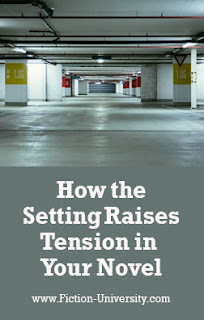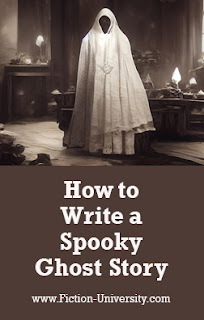Janice Hardy's Blog, page 13
December 7, 2022
On the Road: 3 Easy Tips to Help You Revise Your Novel
 I'm guest posting over at Writers in the Storm today, chatting about ways to revise your novel. Come on over and say hello!
I'm guest posting over at Writers in the Storm today, chatting about ways to revise your novel. Come on over and say hello!Here's a sneak peek:
3 Easy Tips to Help You Revise Your Novel
While there’s something exciting about writing a first draft, I always look forward to the revisions. It isn’t until I see how my story unfolds that I fully understand where I can make it stronger, and turning that literary lump of coal into a diamond is quite rewarding–and a lot of fun. I won’t lie, it’s also a lot of work, but well worth it.The list-maker in me has a whole folder filled with revision tips and tricks, from lists of words that commonly indicate weak prose, to templates to check my goal-conflict-stakes structure, to questions to ask in every scene.
Here are my three favorite tips for revising a novel.
(Visit WITS to see the rest of the article)Written by Janice Hardy. Fiction-University.com
Published on December 07, 2022 06:32
December 5, 2022
Will They or Won’t They? Plotting With Yes or No Questions
 By Janice Hardy, @Janice_Hardy
By Janice Hardy, @Janice_HardyA strong scene is really just a series of questions.
Plotting is both easy and hard. It's easy because it's has a simple set of rules and a clear structure on how it works. It's hard because there's an infinite number of ways you can follow those rules and fill in that structure.
But it all comes down to just answering yes or no.
Basic scene structure says a scene can end in one of four ways: A yesA noA yes but there's a catchA no and it makes things worseThese questions are designed to move the story forward and advance the plot. Some work better than others, because they leave more room for solutions and options and give the plot a place to go.
Continue ReadingWritten by Janice Hardy. Fiction-University.com
Published on December 05, 2022 03:00
November 28, 2022
A Quick Tip for Getting to Know Your Characters--And Your Plot
 By Janice Hardy, @Janice_Hardy
By Janice Hardy, @Janice_Hardy A single item can tell readers a lot about who your character is.
Several years ago I sat in on an RWA workshop on character building, led by romance author Susan Elizabeth Philips. I've attended her workshops before and she's always been entertaining and informative.
She gave a tip (and did an exercise) that I've tried before:
List the contents of your character's purse.This has never worked for me since my fantasy characters don't usually have purses, but she added the phrase "or their backpack or pockets" to it. That broadened it some, and I realized that ultimately, what she was saying was:
What does your character feel is important enough to carry around with them?
It's a slightly different way of looking at this character-building tip, but a subtle shift in how we consider something is often all it takes to turn a "not for me" tip into something that clicks and becomes incredibly helpful.
Continue ReadingWritten by Janice Hardy. Fiction-University.com
Published on November 28, 2022 03:30
November 21, 2022
3 Ways to Connect Your World to Your Story
 By Janice Hardy, @Janice_Hardy
By Janice Hardy, @Janice_Hardy Your story’s world can create unique problems for your protagonist.
Every story starts a different way—not in the “Once upon a time” aspect, but in how the idea first comes to you. Maybe it’s a line of dialogue, or a character, or a puzzle that needs to be solved. Something flashes through your brain and ignites a spark of imagination that you just have to explore further.
For my novel, The Shifter , the idea of a boy who could shift pain came first, and a world where that would be a problem. It quickly led to the creation of pain merchants who bought and sold pain, and how this boy thought going to them for help was a bad thing to do.
I had nothing beyond that. I had no plot, and no conflict. I didn’t even know this boy’s name.
But I did have a very cool world to play with, so I started brainstorming how a world that could buy and sell pain would operate. How did the mechanics of that work? Why did people even need to do it?
Eventually, I figured out the how and why, and then I found my story.
Continue ReadingWritten by Janice Hardy. Fiction-University.com
Published on November 21, 2022 04:36
November 14, 2022
A Fun Way to Brainstorm Your Next Story Idea
 By Janice Hardy, @Janice_Hardy
By Janice Hardy, @Janice_Hardy Your favorite story, movie, or TV show can be the key to your next great novel idea.
I think for most of us, ideas are pretty easy. They pop into our heads all the time, either as a general concept, a fun character, or an interesting situation. What’s hard, is turning that idea into a workable conflict with a plot that will become a strong novel. That’s where the real skill comes in.
Next time you’re stuck on what to do with your idea, or just need a way to generate an idea, turn to your favorite movies and books and “steal” what you love about them (and no, I’m not advocating plagiarism here, bear with me).
One of my favorite movies is Mama , a creepy, horror/psychological suspense that turns the whole idea of conflict and what it means it be an antagonist on its head. Continue ReadingWritten by Janice Hardy. Fiction-University.com
Published on November 14, 2022 03:00
November 7, 2022
How to Make Readers Care About Your Protagonist—and Your Plot
 By Janice Hardy, @Janice_Hardy
By Janice Hardy, @Janice_Hardy If you’re struggling with a lagging story, a lack of character agency might be the reason why.
A helpful-yet-brutal piece of critique feedback is “Why should I care?” Why should readers care about the character, the conflict, or the story in general? Why should they read this novel you’ve worked so hard to create?
“Because it’s my novel and I love it” might be true, but sadly, no one outside our friends and family accept that as a reason. And sometimes, not even then if we have honest critique partners. Potential readers are lost every day to novels that might be good in every other aspect, but they just “didn’t care” what happened to the characters.
Often, this is due to a lack of agency.
Continue ReadingWritten by Janice Hardy. Fiction-University.com
Published on November 07, 2022 03:49
October 31, 2022
How the Setting Raises Tension in Your Novel
 By Janice Hardy, @Janice_Hardy
By Janice Hardy, @Janice_Hardy Your characters’ world provides opportunities to create mood and raise the tension in your scenes.
Universal Studios' Halloween Horror Nights is a perfect example of how a setting can influence the people in it.
The park is decorated with haunted houses and scary set pieces, and costumed staff (some with chainsaws) lurk in the shadows to jump out at guests. One group is startled and they scream, which makes everyone around them nervous, and just when people start to relax, another staff member leaps out. People who normally wouldn't be startled tend to shriek, because the setting already has them on edge.
This isn’t a happy coincidence. These staff members are trained to target guests who typically scare the easiest, so they look for younger people (particular teens and women) in groups, because they scream the loudest, and screams are contagious.
Continue ReadingWritten by Janice Hardy. Fiction-University.com
Published on October 31, 2022 04:00
October 27, 2022
How to Write a Spooky Ghost Story
 By Rayne Hall, @RayneHall
By Rayne Hall, @RayneHall Part of the How They Do It Series
JH: Ghost stories both thrill and chill, ad readers love them no matter what time of the year . Rayne Hall shares tips for writing a spooky tale.
Ghost stories have always been reader favorites. They appeal to a wider audience than most other stories: children enjoy them as much as adults, and even people who normally cringe at the thought of Horror fiction gain pleasure from a good ghostly yarn. How can you write an entertaining, creepy story?
Plot and Backstory
All good Ghost stories consist of two tales. The first is the past tragedy which keeps the ghost haunting in search of atonement or vengeance. The second is about the person whose life gets thrown off course when the ghost intervenes.
The Ghost story needs more pre-planning than most other dark fiction, because you need to weave these two strands together.
Continue ReadingWritten by Janice Hardy. Fiction-University.com
Published on October 27, 2022 04:46
October 24, 2022
Why Every Plot Needs A Ticking Clock
 By Janice Hardy, @Janice_Hardy
By Janice Hardy, @Janice_Hardy Sometimes, characters need a little boost to get them moving so the plot doesn’t stall.
I tend to procrastinate, especially when I already have a lot that on my plate. My to-do list fills up, and any task that won’t get me into trouble if I ignore it falls lower and lower on the list until it’s forgotten.
This can be problematic in life, but it’s deadly for a plot.
If the novel’s problem can be resolved “whenever” and it doesn’t matter when that happens, there’s no sense of urgency to the story. No urgency lowers tension, and low tension makes it harder for readers to care. And a lack of caring means the book will probably wind up forgotten at the bottom of a to-read list.
Continue ReadingWritten by Janice Hardy. Fiction-University.com
Published on October 24, 2022 04:00
October 17, 2022
5 Ways Your Dialogue Annoys Your Readers
 By Janice Hardy, @Janice_Hardy
By Janice Hardy, @Janice_Hardy Make sure your dialogue is helping your story, not chasing readers away.
I read a lot of first drafts, and one area that frequently needs work is the dialogue. It’s understandable since we often need to write the dialogue before we know what the character’s voice sounds like. Think of it as placeholder dialogue—it’s there to remind us what the character needs to say, but it might not be the way they ought to say it.
For example, the character might be too formal, or say something too on-the-nose about how they feel, or they sound like every other character in the room. The dialogue is more “this is the information the character needs to convey” and less “this is what the character says based on how they feel right now.”
Continue ReadingWritten by Janice Hardy. Fiction-University.com
Published on October 17, 2022 03:05



